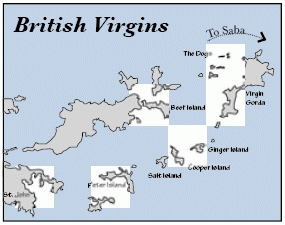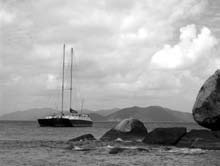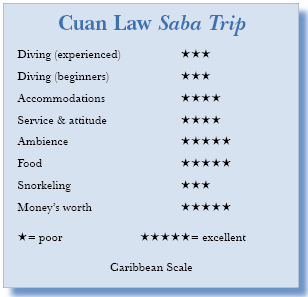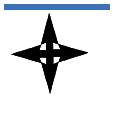Adventuring in the Eastern CaribbeanContents of this Issue: Adventuring in the Eastern Caribbean Coast Guard Not Required to Rescue Divers Just Had Your Tank Inspected? You Sure About That? All I Need Is the Air That I Breathe And the Weird Winner is . . . . Dive Atlas of the World by Jack Jackson (Editor) Editorial Office: Ben Davison Publisher and Editor Undercurrent 3020 Bridgeway, Suite 102 Sausalito, CA 94965 Aboard the “Other” Cuan Law from the January, 2005 issue of Undercurrent
Dear Fellow Diver: As we clambered into the van taking us to port and began chatting about dive experiences and expectations with our fellow guests on Cuan Law's “Adventure” trip (meaning it would go much further afield than the usual seven-day BVI two-tank-a-day trips) the thought entered my mind -– “This isn't your daddy's Cuan Law.” Indeed, a few times a year, the Cuan Law transmogrifies from a families-with-divers-and-nondivers boat, into a fair dinkum dive boat with more challenge than the usual “Caribbean light” trips the ship is known for. I had high hopes the boat and crew could pull off this trick and was ready for high-end Caribbean diving. I eagerly boarded the world's largest trimaran,
moored off BVI's Beef Island airport, and was greeted
by Duncan Muirhead, designer and owner of the Cuan
Law (and the Lammer Law in the Galápagos). The crew
included Captain Chas Ashby (a Brit transplant via
years of hotel management in Kenya, equipped with
a well-traveled sense of humor), South “Effrican”
engineer Ed Naude (if he can't fix it, it hasn't been
invented yet), and the cast that would run the show
for us the next eleven days. The plan was to head
out to the Chikuzen, a nearly 300-foot-long Korean
refrigerator ship sunk in 80 feet of very open water,
described as a fish magnet only diveable during
the calmest waters, such as those we expected this
May. Of course, mother nature has the ultimate say, and weather was most unMaylike with unseasonable winds and wave action. The Chikuzen was unreachable, a major disappointment. So we cruised to The Dogs and dove “Coral Gardens,” where we demonstrated skills at 55 fsw for divemasters Abi Hillman (an English-Cypriot) and “Ajay” Page (Australia), then swam off to see what we could see. A number of venerable conches showed us these waters are treated gently for the Caribbean, and soon we were exploring the small airplane wreck of a Shorts 300 series aircraft with the airline logos painted out, home to a large green moray and other denizens. The one-hour dive, with the aluminum 80s filled at 3,000 psi, was a good one to tune up and balance my weights. The crew allowed us to dive as we saw fit once our “credos” were checked and experience levels established. The next day's dive at “The Invisibles” (pinnacles just under the surface) was pronounced by Dunc himself to be “looking pretty good” at the outset -– but turned out to be hairy with ripping current. Divers were mostly blown off the objective, a couple of buddy teams were split up, and lots of scurrying became the order of the day as the crew was unprepared for the situation and had not launched dinghies. Several divers had to deploy safety sausages (they require everyone to carry one) and were retrieved at varying distances from Cuan Law. After we mercilessly dumped on Dunc, we relocated to safe mooring and a night dive. “The Invisibles” had never been truer to their name. They had scheduled a day at Anegada –- not frequently dived, as it can be dangerous for boats, as evidenced by an estimated 200+ wrecks on the treacherous Horseshoe Reef's shoals. Furthermore, BVI authorities control the permits for diving there. We moored far from the tricky shallows and, after an illustrated dive briefing, traveled in the two hard-bottom inflatables to the 380-foot, relatively contemporary freighter Rocus. Our dive was splendid Caribbean diving for all levels. (Our group included a recently certified diver, a grizzled diver celebrating his 48th “diversary,” and Jade, a Midwestern dive instructor who was back for one more adventure.) We enjoyed a great 80+ foot vis, squadrons of the usual Caribbean suspect fishes were in evidence, and schools of various snappers and streams of Creole wrasse flowed about, dwarfed by the ghostly ribs of the old ship. These and remaining pieces of wreckage made for very photogenic scenery, among them the stern and rudder, boilers and davit (presumably sporting the line used by the captain to hang himself in shame). Adding to the eeriness was the cargo spilled from the Rocus' guts, a huge shipment of sea-blanched cow bones en route from Trinidad to a rendering plant in Baltimore in 1927 –- the reason for her alternate name, “the bone wreck.” Our next scheduled dive was the historic wreck of one of the last paddle-wheeled steamers, the RMS Paramatta, sunk in 1859 on her maiden voyage. Again, the seas denied us a premier dive, so Dunc dinghied back to Tortola and Captain Chas hoisted the sails for our crossing -– not to lonely Sombrero Island, as planned, but, due to the weather, directly to Saba. With the strong headwinds piling up billowing waves, the usually-stable trimaran platform became a veritable galloping Gertie. We had traded the pristine diving and solitude of Sombrero for a long night of a rocking-androlling, gut-wrenching crossing that had most crew and passengers on board “looking for Mr. Roark” (imagine people crawling about the ship calling out his name, and you have it!) At Saba, there is always a sheltered side of the steep, dormant volcanic island, and the deep spires provide fantastic Caribbean diving! There are two ways to dive in the marine park surrounding Saba, land-bound with the excellent local outfits or on one of two live-aboards, the Cuan Law or the St. Maarten/St. Kitts-based Caribbean Explorer II (see Undercurrent, March 2004). At “Third Encounter,” a flat bit at 90-100 feet, a collection of pinnacles emerged from the gloom on our early morning dive. Here were healthy populations of large Nassau and tiger grouper and lots of encounters with pelagics. “Diamond Rocks” was another favorite, navigated differently each time due to currents but a paragon of dive site health, with larger Caribbean angels, schools of horse-eyed jacks and other pelagics, and great vis. Saba's pinnacles are the best offshore and bluewater diving in the Eastern Caribbean, challenging and thrilling for even advanced and skilled divers. While we dived the pinnacles from the inflatables, other dives were made off the moored Cuan Law, including the up and down levels and channels at “Ladder Labyrinth,” with healthy populations of corals and brilliant sponges, large tarpons, and schools of healthy fish, day and night. Sabans have indeed protected their environment –- not much pollution, garbage, or evidence of overfishing or bottom scraping here! Though these shelves are more typically Caribbean dive venues, they are well protected and vividly healthy. Most of us averaged four and even five dives. In between, a few divers offgassed on kayaks or Hobie Cats. The 105-foot ship itself is stable and commodious –- the ten 10 x 10
cabins, convertible twin or double and all en-suite, are laid out forward
and on each side of the airy and spacious salon with its open and wellstocked
honor bar. (A signal at the bar also displays “Dunc Angry” and
“Annie Angry” lights, the equivalent of yellow and red terror alert codes
in the U.S., I was told by one crew member with tongue firmly in cheek.)
Light breakfast fixings (cereal,
toast, juices, and decent coffee), which often appeared a bit later than
scheduled, were available in the salon before the first dive. Everything
else was served under canvas on the huge aft deck on long teak tables that
fold down for passage. Jessica regaled us with après-dive monster breakfasts
ranging from fresh fruits to baked goods (even baked grapefruit!),
pancakes, Portobello mushrooms with cheese, egg dishes, and sausages and
bacon, all in generous quantity. Lunch usually featured soups and salads
(e.g., pumpkin and coconut soup, Vietnam peanut salad), chicken skewers,
melt-in-the-mouth ribs, or rice and beans; for dessert, chocolate-covered
macaroons were a favorite. Dinners, still served al fresco buffet style,
crowned her abilities –- spinach-stuffed chicken served on a bed of couscous,
Beef Bourguignon, pan-seared lamb chops (with mint rice and sautéed fresh veggies), ahi with garlic
butter and buttered herb jacket
potatoes, and excellent Caesar
and other salads. The 12-hour crossing back to BVI was much easier than the cruise down –- we now had quartering winds from the stern, and we all had our sea legs well developed. The remaining days were spent diving such lovely and easy BVI sites as the Ginger Island and Gingers Steps, Manchioneel Rock, Wreck Alley -– with its two purpose-sunk smaller wrecks — and by popular demand an entire day at the RMS Rhone. We enjoyed an end-of-the-trip picnic at the Baths on Virgin Gorda, then washed and dried our gear: the end of another dive trip. I signed up for Cuan Law's adventure trip expecting more than their usual “two dives a day” junket, and they delivered. More importantly, however, I chose this trip because it was billed as an “adventure trip,” one packed with challenging dives on lightly-dived sites, including sites on Saba. Thanks to the weather (the captain proclaimed ours “the worst crossing the Cuan Law had ever made”), many of those dives didn't happen, so I can't attest to whether all that “adventure” really exists. But, because of the quality of the Cuan Law and its accommodations, top-notch food, service, and ambience, I'd be tempted to try it again. — L. J. |

I want to get all the stories! Tell me how I can become an Undercurrent Online Member and get online access to all the articles of Undercurrent as well as thousands of first hand reports on dive operations world-wide
| Home | Online Members Area | My Account |
Login
|
Join
|
| Travel Index |
Dive Resort & Liveaboard Reviews
|
Featured Reports
|
Recent
Issues
|
Back Issues
|
|
Dive Gear
Index
|
Health/Safety Index
|
Environment & Misc.
Index
|
Seasonal Planner
|
Blogs
|
Free Articles
|
Book Picks
|
News
|
|
Special Offers
|
RSS
|
FAQ
|
About Us
|
Contact Us
|
Links
|
3020 Bridgeway, Ste 102, Sausalito, Ca 94965
All rights reserved.

 The crew dressed the tanks -– they store them outside on the spacious poop-deck,
which also means gear is exposed to
the elements and salt during rough
waters. Thirty-two percent Nitrox
is blended here as well, though the
equipment malfunctioned during our
trip.
The crew dressed the tanks -– they store them outside on the spacious poop-deck,
which also means gear is exposed to
the elements and salt during rough
waters. Thirty-two percent Nitrox
is blended here as well, though the
equipment malfunctioned during our
trip. Cabins and heads are illuminated with
large bubble-skylights that double as
escape hatches –- the Cuan Law meets
all safety regs of Transport Canada, as
Dunc built her in that northern land.
Hammocks (and windsurfers and kayaks
for recreation) adorn the massive
flat deck above the trimaran's body. If
watching or editing video floats your
boat, there is a large “theatre” in the
aft portion of the center hull –- you
can crank up the volume, and nobody
will hear you here!
Cabins and heads are illuminated with
large bubble-skylights that double as
escape hatches –- the Cuan Law meets
all safety regs of Transport Canada, as
Dunc built her in that northern land.
Hammocks (and windsurfers and kayaks
for recreation) adorn the massive
flat deck above the trimaran's body. If
watching or editing video floats your
boat, there is a large “theatre” in the
aft portion of the center hull –- you
can crank up the volume, and nobody
will hear you here! Desserts
ranged from a sweet Pavlova and
pudding with chocolate ice cream
to rich chocolate cake (served
with Champagne!) and apple turnovers. If the chef makes the
boat, Jessica's cooking was well
up to the world's largest trimaran.
Desserts
ranged from a sweet Pavlova and
pudding with chocolate ice cream
to rich chocolate cake (served
with Champagne!) and apple turnovers. If the chef makes the
boat, Jessica's cooking was well
up to the world's largest trimaran. Diver's Compass: Most passengers are Americans, with
some Canadians, British and other Europeans; families welcome.
Cuan Law's family trips are well covered in the April
2000 Undercurrent. . . Cuan Law also has an October adventure
including the wrecks of Anegada, “the secret island
of” Sombrero and pinnacles of Saba (10 days, 11 nights)
at $3150 per person. Booking, land stays at Serendipity
House near Josiah's Bay, and all transfers can be arranged
directly at
Diver's Compass: Most passengers are Americans, with
some Canadians, British and other Europeans; families welcome.
Cuan Law's family trips are well covered in the April
2000 Undercurrent. . . Cuan Law also has an October adventure
including the wrecks of Anegada, “the secret island
of” Sombrero and pinnacles of Saba (10 days, 11 nights)
at $3150 per person. Booking, land stays at Serendipity
House near Josiah's Bay, and all transfers can be arranged
directly at 